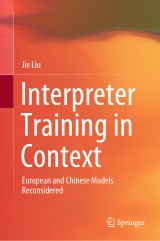Details

Interpreter Training in Context
European and Chinese Models Reconsidered|
106,99 € |
|
| Verlag: | Springer |
| Format: | |
| Veröffentl.: | 07.10.2020 |
| ISBN/EAN: | 9789811585944 |
| Sprache: | englisch |
Dieses eBook enthält ein Wasserzeichen.
Beschreibungen
<div><div>This book addresses an important, yet under-researched domain in interpreting education: how theoretical training models should be responsive to context. To do so, it applies the linguistic concept of ‘context’ to interpreting studies by investigating practices in representative (conference) interpreting training programmes in Europe and China. After presenting an overview of interpreter training programmes, the author describes the need to reassess the applicability of the well-established and widely accepted model of interpreting from the Paris School (ESIT/AIIC model) to the Chinese interpreting training scene.</div><div><br></div><div>Building on the theoretical study of context in foreign language classrooms suggested by linguists like Halliday and Hasan (1993); Kramsch (1993) and others, the author subsequently constructs a new curriculum, comprising a four-step approach to consecutive interpreting courses in the Chinese context. The rationale for such an approach is justified in accordance with the overall design of context, taking into account the four dimensions in a teaching–learning environment.</div><div><br></div><div>This book is intended for scholars and graduate students who are interested in translation and interpreting, applied linguistics as well as foreign language education. It also serves as a practical guide for developing (university-level) translation and interpreting programmes. </div></div>
Chapter 1 Introducing Basic Concepts of Interpreting and InterpreterTraining.- Chapter 2 Contemporary Interpreter Training Practices in Europe and China.- Chapter 3 Acquiring Interpreting Competence through Training: European and Chinese Training Models Explored.- Chapter 4 Didactic Approaches to Interpreter Training: Contexts, Approaches and Coping Tactics.- Chapter 5 Optimizing Interpreting Education in the Chinese Context: Principles, Curriculum and Pedagogy.- Chapter 6 Towards a Contextual Model for Interpreter Education.
<div>Jie Liu is currently a Postdoctoral Fellow under the "Postdoctoral International Exchange Program" at Central China Normal University (CCNU) in Wuhan, China. He received his Ph.D. from Utrecht University (2015) and has been a Research Scholar at the University of Florida. Previously, he held an Associate Professorship at the National Huaqiao University, where he also served as Lead Interpreter. His work has been published in several international interpretation and translation journals. Over the past decade or so, Jie Liu has been an active conference interpreter and member of the Translators’ Association of China (TAC), and the European Society of Translation Studies (EST).<br></div>
This book addresses an important, yet under-researched domain in interpreting education: how theoretical training models should be responsive to context. To do so, it applies the linguistic concept of ‘context’ to interpreting studies by investigating practices in representative (conference) interpreting training programmes in Europe and China. After presenting an overview of interpreter training programmes, the author describes the need to reassess the applicability of the well-established and widely accepted model of interpreting from the Paris School (ESIT/AIIC model) to the Chinese interpreting training scene.<p>Building on the theoretical study of context in foreign language classrooms suggested by linguists like Halliday and Hasan (1993); Kramsch (1993) and others, the author subsequently constructs a new curriculum, comprising a four-step approach to consecutive interpreting courses in the Chinese context. The rationale for such an approach is justified in accordance with the overall design of context, taking into account the four dimensions in a teaching–learning environment.</p>
This book is intended for scholars and graduate students who are interested in translation and interpreting, applied linguistics as well as foreign language education. It also serves as a practical guide for developing (university-level) translation and interpreting programmes. <p></p>
This book is intended for scholars and graduate students who are interested in translation and interpreting, applied linguistics as well as foreign language education. It also serves as a practical guide for developing (university-level) translation and interpreting programmes. <p></p>
Provides a panoramic overview of major interpreter education models in Europe and China Includes essential information on key elements in interpreter education—curriculum models, didactics, and educational psychology, especially as regards (non-Western) emerging countries like China Presents a four-step curriculum to help university-level interpreting/translation educators in ‘non-Western’ emerging economies Highlights the importance of ‘context’ in implementing interpreter education models

















